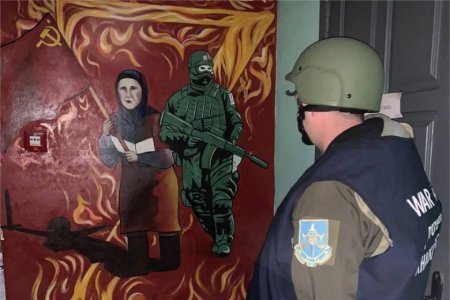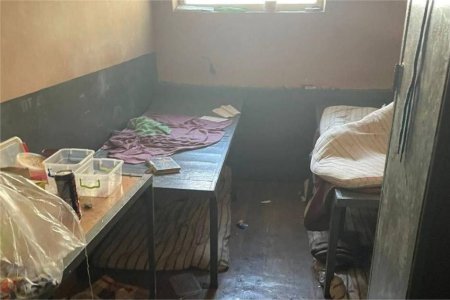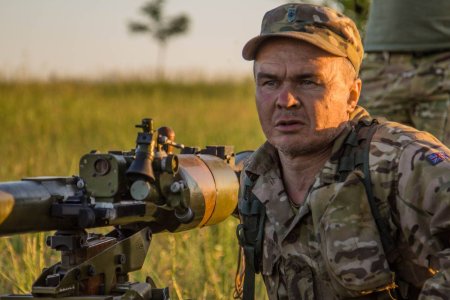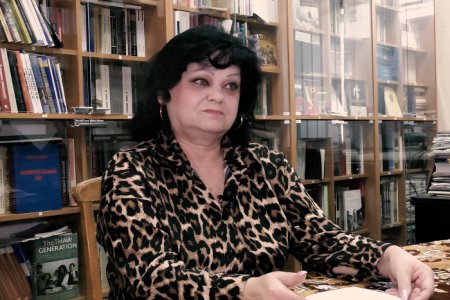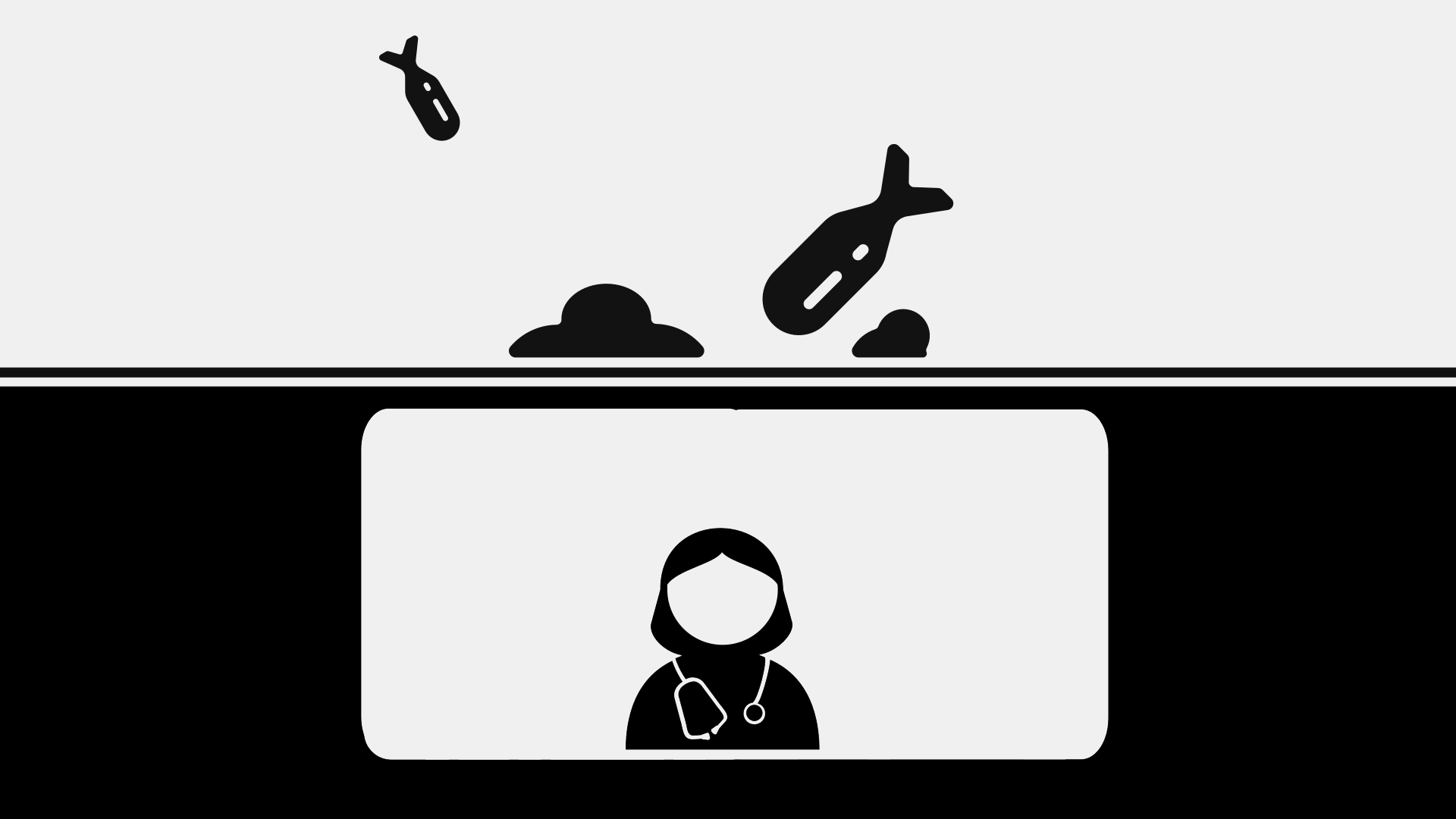
31-year-old Hanna Shevchyk used to work in a maternity hospital in Mariupol. During the war she had to spend a month in the bomb shelter under the sweets factory. Her story is different from other stories of life during the hostilities due to a great number of medical details, and makes it clear what diseases people living in shelters face and how to help them when equipment and medicines are lacking.
Since the first day it turned out that I am the only doctor in the shelter. Because of that I was considered the most valuable there. They called me constantly, every day, for any reason.
I asked men to go and find medicines. They brought medicines that remained in the ruined pharmacies. Some medicines were brought by Ukrainian military and that helped a lot. I equipped an improvised locker for myself in which I divided medicines by groups to be able to provide help. I was later brought a tonometer and a phonendoscope which was bad, but at least it was something. People started to get severely sick one by one. A woman had a hypertensive crisis, I had to “drip” her in the shelter. Good thing that I had the system and magnesium. An intestinal infection began to spread. It all started with a four-month-old child, Yegor, who started having stomach aches, vomiting, diarrhea and high temperature. We tried to make him drink and treat him in other ways., but soon I realized that the situation could not be solved without antibiotics.
The intestinal infection was so severe that any antibiotic that was put in the mouth of a child or an adult would come back. There had to be injections done instead and so I started doing it. In time I faced the problem that we had the antibiotics for injections, but essentially didn’t have syringes. We had ten-cubic syringes and there were a few two-cubic syringes as well. Everyone started getting sick and everyone had the same symptoms plus terrible weakness that could not be cured by anything. I had to do injections and I had to sterilize the syringes. We had disposable suringes and we used water to wash them, any water we could find, be it rainwater or the water from the melted snow. Later we filled the syringes with vodka to sterilize them at least somehow to be able to help people.
We had an autistic boy who had seizures and we didn’t have any medications to help him. He also contracted the intestinal infection — thank God, he overcame it and got better. However, that four-month-old boy, he had parents who were very worried, they wanted their child to get better instantly. Of course, he was sluggish and very capricious. There was the hospital No.3 nearby — the children's city hospital where the maternity ward was located, everyone now knows about that place.
On March 9 a Russian military plane dropped a bomb on the maternity hospital in the center of Mariupol.
I told the parents to go there. Maybe, they will be provided with a drip and supervision there, because I did not have the needles small enough to inject such a little child. The father said “OK, Ania, we will go. I will find a car, we will go, get a consultation and return”. They went and on the next day that hospital was hit. Everyone knows that a lot of people suffered there. The maternity ward was ruined. Children's somatics ward was destroyed. On that moment I sat and thought: “My God, I sent people to die”. I was very scared because I felt everyone in the shelter to be a sort of my relatives. I knew everybody, their family and their fate. I kne who lived where, even, in which building. Never mind all the rest.
But, thank God, they survived, they were OK. They arrived back to us on foot. Then Ira, Yegor’s mom, fainted at once and I began reviving her with “ammonia”. She opened her eyes and the first thing she said was: “Have you ever seen pregnant moms without an arm and a leg?”. She said “Ania, you can’t imagine what’s going on there. Dead children were lying there. It was scary”. I've been thinking about all of this many times, but I coulnot do it calmly, without tears (she wiped her tears with a handkerchief).
Then the older children started to get sick. A year and a half old child fell sick. I also had to inject him. Because the temperature did not drop the entire a week and he did not get better. I found analgin with diphenhydramine, the only one ampoule I had, and injected it at my own risk. His temperature dropped, but the next day my son had a fever. And the next day my nephew. I realized that I was saving one child to the detriment of another. Then I realized that I needed to bring down the temperature of my son, and I have nothing, absolutely nothing. This is a war, and we need to do with what we have. Thank God that we had antibiotics and that I packed my backpack with medicines which I had at home and some I was able to buy later at the pharmacy. With that I was able to help my children - nephew and son, I helped other children as well.
Then the adults started getting sick. The medicines were running low, and I had to choose who I could give it to and who I couldn't. I made a decision for myself necessary for the war times: I gave medicine to younger people and children and didn't give it to the elderly, because there would not be enough for the young.
Then people began to die. Two men died in one day. They both were elderly, one did not have an arm, another one was just old. They both were loners, did not have families or their families were far away. They didn’t talk much.
There was a very powerful shelling and everything was burning around: all stores and the central market. Our plant was also hit, it already had no glass and other parts were missing. We couldn’t bury people. They were simply taken outside and put far away, because we had no opportunity to dig graves.
Then we learned from out friends that their house was heavily shelled. It was hit and the entire yard burned down. My brother sent his acquaintances wuth the car to take them out of there. They brought their entire family, in fact, two families: Alina with her husband and son and another family — Olexiy, Lera and their little son. They also brought their mom, Lyubov. One day Lera asked, “Ania, can you take a look? She [Lyubov] has troubles with her leg”. I saw that she had a very large diabetic foot on her heel. She had a huge ulcer that was poorly supplied with blood. She also had very high blood pressure. She did not feel well and could barely walk. I started asking why it wasn't discovered earlier. She explained that she had recently suffered from Covid and had been in the hospital for a long time. She had diabetes, hypertension and other comorbidities…
The only thing that I could offer was to remove the necrosis from the heel to slow down the process. I said “You should understand and prepare that in the current situation she may not survive”. I removed the necrosis and she got a little better, but beginning the next day she got worse by day. She began to weaken. We put her down, covered her with makeshift curtains, a cloth someone had found, and sheets. I just went to her from time to time and watched what was happening to her. I told Lera and Alina, her daughters, that I could give her painkillers — I had a powerful painkiller in my kit. “But you must understand that we cannot constantly do it. Sooner or later she will be gone”. I gave her a painkiller, she got better and slept during the night. Then, through the military , I found diclofenac in ampoules — we also started giving it to her.
Later Alina said she will be giving injections, so that not to not wake me up at night. Every night I slept badly, because somebody constantly woke me up. But in truth, it was good. Thanks to it many moments were easier for me, because I was needed, I was important. Everything was so dynamic, no time for rest, no time for self-pity. You only showed pity for somebody else to give them moral support.
A week and a half later Lyubov got much worse. I approached them and said that I can administer a drip wich coul extend her life a bit. But I was not sure if it's really neede if we know that she still will be gone? We would spend the medicines that may be needed for the people who arrive with injuries and who can be saved. Lera and Alina understood me. They said they fully supported me and knew what I was talking about. We were just waiting. A week and a half later Lera called me to check if she was breathing. I sat with her for a while and then she was gone.
As with all the deceased , we bound her jaws and hands. Lera and Alina asked me what to do and how to do it. I didn’t have much experience, but I knew what to do because not so long ago I buried my grandmother. I begged the men who were in the shelter to dig a hole, if it was a bit quieter in the morning. After all it was my friends’ mom. They succeeded, Alina and Lera said goodbye to their mom and she was buried near the shelter. They even found a prayer book so that she could have memorial services.
I had two pregnant women: one on 34th week, another one on 36th. One had a powerful intoxication, also an intestinal infection. Her temperature was 42 degrees and could not be brought down. I was very afraid that she will begin giving birth right there. I am a neonatologist, pediatrician. Yes, I know a lot, I studied a lot, but I haven’t delivered a child yet. I didn’t need such experience. Heaven forbid something happens, and I don’t have anything. I asked a volunteer guy to ask the military if there are any tools — clamp, needle, suture material. I asked for diapers, oxytocin, hemostatic — everything you might need. Thank God, these girls have recovered: the intoxication has passed, the temperature normilized. Then their husbands and another guy were able to pick them up and take them out of town. We didn't even know if they had arrived, if they were safe, if they had been able to leave the city. Everyone did it at their own risk.
We did not have a car and we realized that we will be staying there for long. We spent a month in that shelter. Each time when people left, and there were fewer and fewer people in the shelter , it was very scary because we realized that we will have to stay there for who knows how long. It wasn’t clear whether there will be enough food, water, whether there will be rains, etc.
“And then the Russians came.”
When there were our guys, Ukrainians, it felt calmer. You knew that our guys will protect you, that all will be well. Then the Russians came and ruined the drama theater in which there were so many people. There were over 800 people. A half of them were coming to us asking for food when the store still worked in a way. Then the Drama Theater was ruined and many people died there, some arrived to us to the shelter in the neighboring basement. It was scary to look at them. We were used to the shelling, but we did not have as many wounded and as many woes. They saw a lot of woes, they arrived with injuries. Of course, all injured persons passed through me.
There was one woman who was saved by a down jacket. She was wearing a very thick black down jacket, and one fragment was stuck on her back in the down jacket. Another hit to the side, got stuck in the spine and stayed there. She came and said: “We were examined by a field surgeon and he told us there were no shrapnel”. I started looking and I found a huge wound, pus is flowing from it. I treated the wound, I start to palpate to feel it.
— You have a shrapnel in your back.
— No, the doctor said there aren’t shrapnel.
— The doctor may have said it, but the shrapnel is there.
— What do I do?
— Move less. If the shrapnel moves, getting it out would be impossible, because we could damage something and you will remain paralyzed. So you need to lie down and hope that the body will accept it as its own, cover it with connective tissue, and it will all overgrow. The main thing is to process the wound.
She healed well. Her husband, by the way, found a metal detector, ran it over her back, and it turned out that there was still a shrapnel. Well, the field surgeons [didn't see it], and the 30-year-old pediatrician was able to find out it was there.
